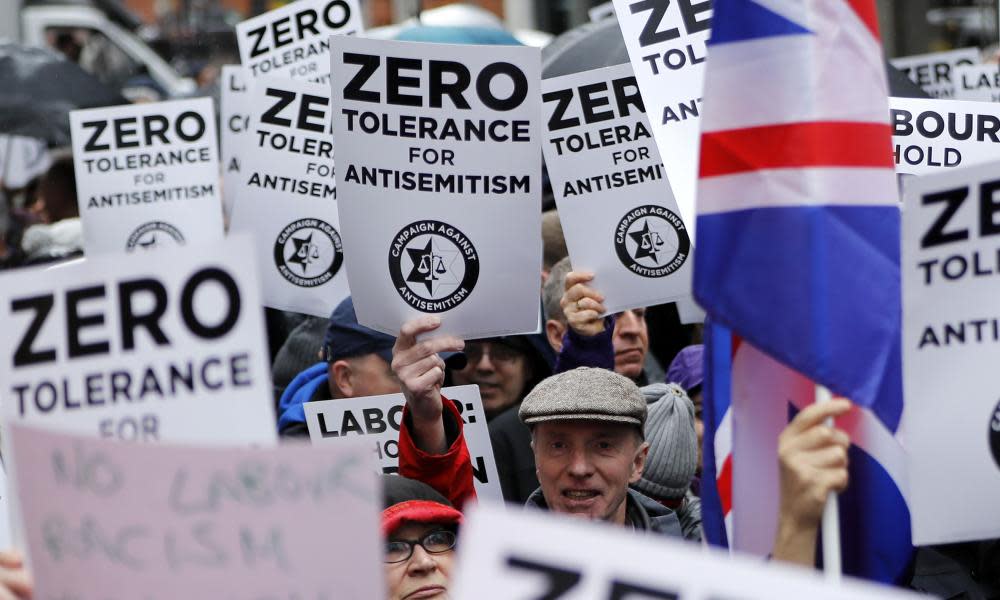What to look out for in EHRC report on Labour antisemitism claims

The long-awaited report into allegations of antisemitism in the Labour party by the equalities watchdog will be published on Thursday. The Labour leader, Keir Starmer, has said the party will accept all the recommendations of the report, which the shadow health secretary, Jon Ashworth, has called the most shameful moment in the party’s history. These are the key points to look out for in the report:
Has the Labour party broken the law in its treatment of Jewish members?
The key finding the party must respond to is whether it has broken equalities laws – which could leave the party open to further legal action.
The finding would hinge on the experience of Jewish members within the party, which the EHRC has sought evidence on. Labour has already settled in court with whistleblowers who spoke to the BBC about antisemitism, who say they were then defamed by statements from party spokespeople.
Is Labour ‘institutionally antisemitic’?
That claim has been made by several former MPs, including Ruth Smeeth, and others who left the party over Jeremy Corbyn’s leadership such as the former Jewish Labour Movement chair Luciana Berger.
If the EHRC were to make this finding, based on the Macpherson report – which described institutional racism as the “collective failure of an organisation to provide an appropriate and professional service to people because of their colour, culture, or ethnic origin” – it would not mean the party itself was entirely staffed by racists. It would mean a discriminatory culture developed, including through “unwitting prejudice, ignorance, thoughtlessness and racist stereotyping”.
That could also mean the processes for redress were inherently biased against complaints from Jewish members and that there was a culture of denialism around the problem.
What is said about Jeremy Corbyn and the figures around him?
Many of the key individuals involved during the period under investigation, including the former general secretary Jennie Formby, Corbyn’s chief of staff Karie Murphy, the head of complaints, Thomas Gardiner, and the director of communications Seumas Milne have left their roles in the party.
Prominent figures who may face criticism are the former mayor of London Ken Livingstone and the former MP Chris Williamson.
Senior Labour insiders expect it to focus on the failings of the party as a whole, rather than indicting individuals for specific decisions. It is understood that those who have been named in the report will have been given limited sight of its findings.
Some antisemitism campaign groups may be disappointed unless the watchdog fingers Corbyn personally for his role in the scandal.
Was the party’s investigatory and disciplinary processes adequate to cope?
Murphy wrote in a piece for the Guardian this week that she was proud of her record as chief of staff in tackling antisemitism – despite multiple complaints that she and other members of Corbyn’s offices interfered with the complaints process especially when complaints were made about members previously associated with Corbyn.
Murphy cited an audit of more than 300 antisemitism complaints received by the party from November 2016 to February 2018, which found that only 34 had been investigated. She alleged that changes brought about by Jennie Formby as general secretary – Formby has since left the role – led to a fourfold increase in expulsions per case.
The report is likely to go into the most detail about whether party processes were adequate to deal with an onslaught of antisemitism complaints – and whether there was any improvements after three internal and external inquiries – the Baroness Royall report, the report by Shami Chakrabarti and the House of Commons select committee report.
Was Labour’s ability to deal with racism complaints hindered by toxic political factionalism over Corbyn’s leadership?
Relations broke down during the course of Corbyn’s tenure not just with Jewish community leaders but with the party’s Jewish affiliate – the Jewish Labour movement – which became one of two key complainants to the EHRC.
Whistleblowers in the complaints department of Labour HQ who spoke to the BBC Panorama programme made a number of serious claims about the party’s internal culture for dealing with complaints of antisemitism, suggesting key figures meddled in complaints.
Some of the whistleblowers were then themselves named in a leaked internal report this year that revealed what it called a “hyper-factional” environment, in which hostility to Corbyn’s leadership hampered the smooth running of complaints procedures. The leaking of that report, and its contents, are the subject of an independent review chaired by the QC Martin Ford.

 Yahoo News
Yahoo News 
